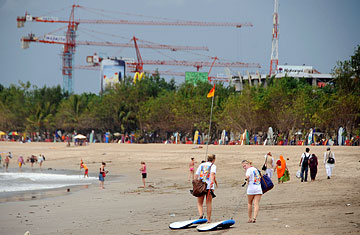Since March last year, Bali is among the hardest hit by the economic impact of the coronavirus pandemic, which has put global travel to a halt.
Indonesia’s most popular tourism destination, globally famous for its preserved culture and home to beautiful beaches and ancient temples amid a myriad of hype nightclubs, is ranked in the bottom of 34 provinces after its economy shrank by 10.8 percent in the second quarter.
The tourism sector accounts for around 80 percent of the province’s revenue sources and almost all of its labor force work in the business.
The impact of the pandemic is more devastating in Bali than in any other area in the archipelago.
Since April, foreign tourists have left Bali. The hotel occupancy rate in August hit a new low at only 3.68%, in comparison to 67% in the same month last year. The economic impact is felt not only by hotel owners or resort managers but also by their employees and those working in supply chains of the business. They all must quickly adapt to the new condition and fight together to survive.
Ida Bagus Prawira, who teaches tourism, had to find a part-time job as a tour guide to support his family.
“I don’t care if it is only three to six tourists coming to Bali, I will definitely serve them. As long as I can eat for today, I am really grateful,” Prawira said.
I Wayan Tana, a farmer, and owner of Malini Agro Park in Uluwatu no longer grows fresh vegetables due to falling demand. Foreign tourists no longer come to Bali due to global travel restrictions so currently, his agro park is forced to only plant cassava for its own consumption. As a businessman, he has laid off dozens of employees, leaving only five people.
Bali’s well-known tourism destinations like Pura Luhur Uluwatu and Tanjong Benoa water sports have also experienced a significant decrease in the number of visitors. The colossal Kecak dance which usually involves around 60-100 dancers and earns up to Rp 6 billion per month at Pura Luhur Uluwatu cannot be performed anymore due to a lack of audience.
Water sport activities in Tanjong Benoa have been suspended due to regulations on the use of scuba diving and snorkeling equipment because they are related to the respiratory tract. For now, water sport equipment shops cannot rent their equipment even though Bali offers wonderful diving spots in calm bays, rich with coral gardens and colorful marine biodiversity.
Villa Amarteraa Villas Bali Nusa Dua laid off contract workers because there were no guests which resulted in financial problems for the hotel managers. Currently, the luxury hotel has to cut all expenses on dining services and digital TV services to survive.
World-class surf spots like Kuta, Seminyak, and Jimbaran — where many of the island’s finest hotels and villas are located — also look deserted without visitors.
Muaya Beach, famous for seafood and barbeque parties, is barely empty with just a grilled corn trader around.
The current condition prompted the provincial government to adopt new tourism regulations more related to health protocols, while tour operators duly follow the guidelines. But they need support from investors to invest in Bali for post-pandemic economic activities.
The Tourism and Creative Economy Ministry is helping dive and water sports operators in implementing health protocols in this specific sector and providing them with certificates of compliance after an audit. The certification is an effort to regain the confidence of international divers when global restrictions are lifted.



